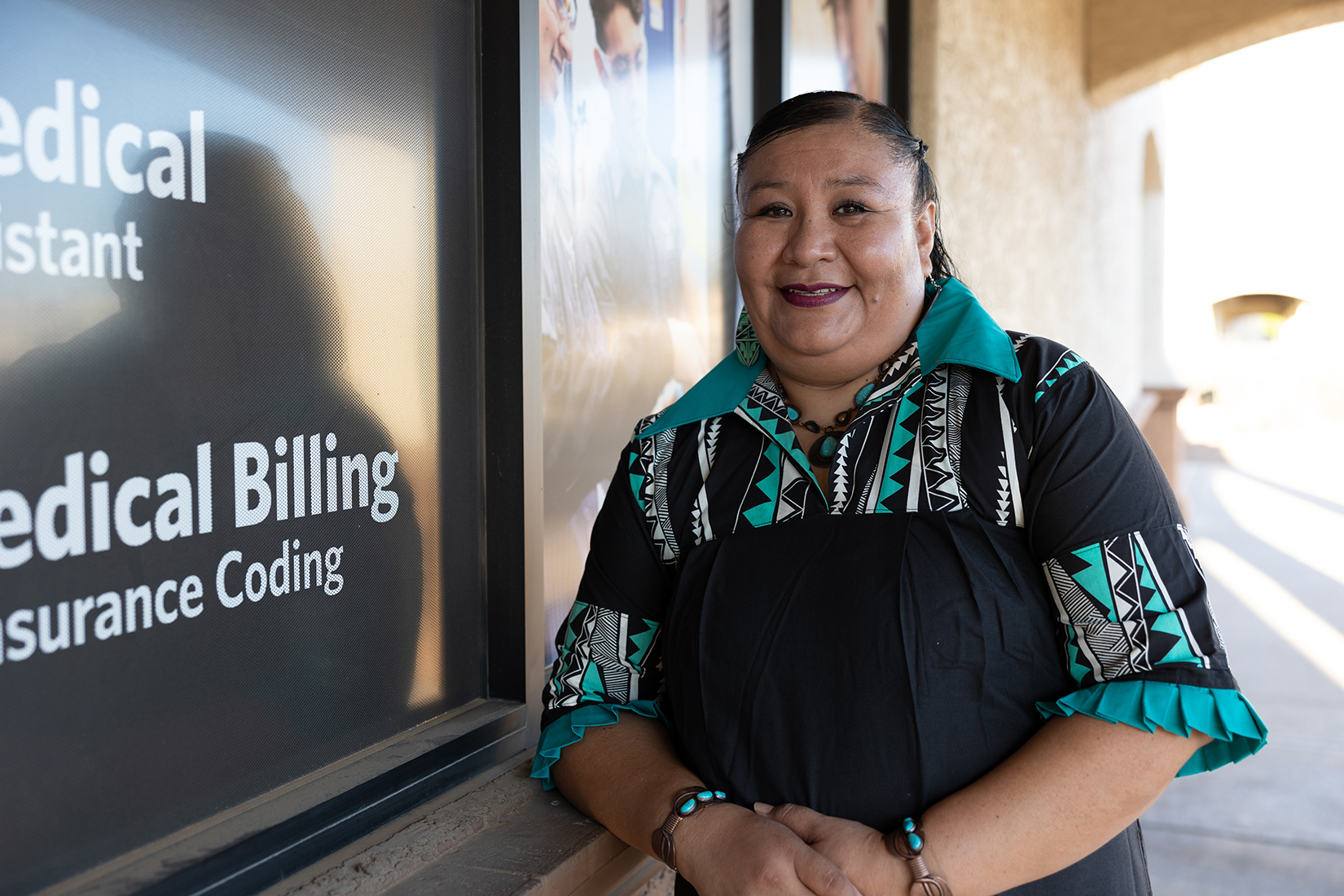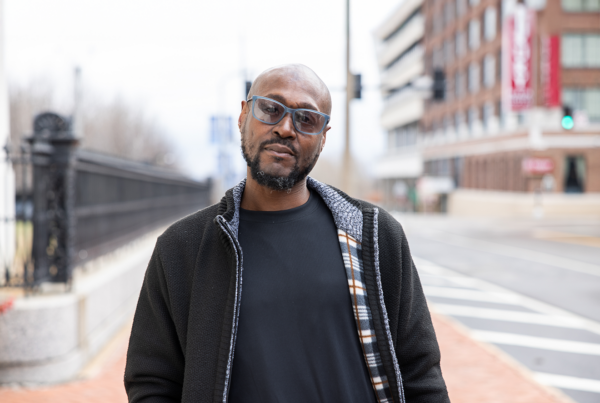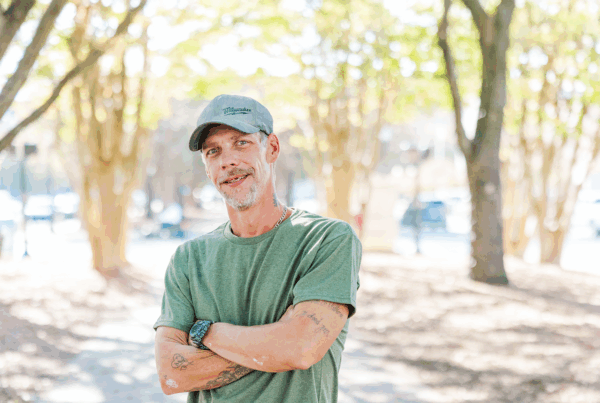When Lisa decided at the age of 46 to go back and finish high school, she knew it wasn’t going to be easy. She was living out of her car with her husband and barely able to make ends meet. Then things started to look up. The couple moved into an apartment in Phoenix, and Lisa was on track to graduate.
After nearly 30 years, it finally seemed Lisa’s dream of graduating high school was within reach. In fact, it was only one week away, when suddenly it all came crashing down. Before she knew it, she would be sitting in jail with a $20,000 bail standing between her and her freedom.
It had been a long and arduous journey.
Lisa is from the Hopi tribe. She was born on the Hopi reservation, located in northeastern Arizona, and raised there by her great-grandparents. At 18 years-old, she became pregnant and decided to leave high school to care for her child. She dreamed of going back to school and finishing her education, but as the years passed, her family grew and she focused on raising her five children. Nonetheless, she made herself a promise that one day, she would go back and finish high school.
Twenty years later that day finally came. With her kids now off to pursue their dreams, Lisa decided to leave the reservation and move to the big city: Phoenix.
Lisa lived with her niece for the first few years and then moved in and out of different women’s shelters and motels. When her wallet and driver’s license were stolen in 2017, Lisa didn’t think much of it. It wasn’t until two years later, when she learned prosecutors were accusing her of allegedly “embezzling” a rental car in New Mexico — a place she had never been — that she realized her identity had been stolen.
But Lisa did not think her open case in New Mexico would be a problem as she planned to continue attending the court dates as needed until the matter was resolved.
Unfortunately, she had missed a court appearance without realizing. Her lawyer had misspelled her email address by mistake and she was never notified. As a result, a judge issued an out-of-state bench warrant for her arrest.
Months went by before she learned this had happened. Once she did, she made plans to travel to New Mexico to address the matter, but before she had a chance, police arrested her. She was booked into jail and a judge set bail at $20,000.
It was an amount far beyond her reach. In fact, it was more than a year’s rent. Without the money to pay bail or hire a bonds company, Lisa’s only options were to plead guilty or stay in jail until her case was resolved. She had no criminal record and knew the consequences of getting one. So, she decided to stay in jail to fight her case even if it meant missing her final week of courses and becoming disqualified for graduation.
Lisa is one of hundreds of thousands of people across the nation who are jailed each year for having an outstanding bench warrant for minor offenses, such as failing to appear in court, unpaid traffic tickets or jaywalking.
Pretrial detention disrupts a person’s life. For Lisa, this meant risking homelessness again, since she could no longer work to contribute her share of rent, and derailing her education.
When it comes to examining the negative impacts of flawed criminal justice policies on vulnerable minority groups, Native American women are often left out of the conversation despite facing unique challenges at every stage of the legal process.
For instance, Native women are overrepresented in the incarcerated population. Based on 2010 U.S. census data, Native women made up 2.5% of women in prisons and jails despite just making up 0.7% of the total female population. A recent report by the Lakota People’s Law Project found that Native American women are incarcerated at six times the rate of white women.
In September 2021, about one year before Lisa was jailed for failure to appear in court, she applied to UEI College in Mesa. She was accepted into the campus’ vocational program and awarded financial aid. In addition to signing up for classes to finish high school, Lisa enrolled in courses so she could earn a medical billing and insurance coding certificate.
Going to school while experiencing homelessness isn’t easy.
Lisa’s school provided her with a laptop. During the day, she attended class and at night worked on homework. Sometimes she would sit in her car to study for tests and work on assignments. Other times, she would do her homework at a McDonalds or Starbucks so that she could use public wifi. And when she needed to shower, she went to a Planet Fitness gym.
During this time, Lisa continued to deal with her out of state criminal case in New Mexico. She had good intentions of resolving it. In fact, she had already made the nearly 16-hour round trip drive several times in order to appear in court.
During one such court appearance early last year, Lisa said she was told it was not likely she would have to return to court until July 2022 because of COVID. It turns out a grand jury indictment hearing was scheduled earlier than anticipated, in November 2021. But Lisa hadn’t been notified that her appearance was required in court because her lawyer misspelled her email address by mistake.
People miss court for a variety of reasons, but it’s seldom because they are purposely trying to avoid the law.
Based on the The Bail Project’s experience providing free bail assistance and pretrial support, people make the overwhelming majority of their court dates (over 92%) without the financial incentive of bail. When they miss court, it’s usually because of practical obstacles, such as lacking transportation, having a work schedule conflict, or lacking childcare.
In Lisa’s case, she hadn’t realized she missed court until several months later because her lawyer misspelled her email and she wasn’t notified. She learned she had an outstanding bench warrant when she had to submit fingerprints for a job application to be a caretaker for the elderly.
Lisa immediately asked her lawyer to file a motion to quash the warrant and made plans to take time off school in order to travel and deal with it in person.
But before she could, police showed up at her house to arrest her. It was early Saturday morning and Lisa was taking out the trash in her pajamas and slippers. She never came back. Handcuffed in the patrol car, she asked the officers to at least tell her husband what had happened, but they ignored her request.
Lisa’s situation is not unique. Some of society’s most vulnerable people — such as those with disabilities, low-wage workers, single-mothers and minority groups — who have outstanding bench warrants, live in fear of the day Lisa just experienced. Not only did Lisa miss her graduation day ceremony, but she was now at risk of getting evicted from her apartment. She had only moved in six months ago with her husband and the couple lived paycheck to paycheck.
The couple felt like they were being forced into a corner.
On the outside, Lisa’s husband struggled to pay rent.
“My husband was doordashing every night into all hours of the night to help pay for our bills, make money for what we needed, and to save money on the side,” Lisa said.
Inside jail, Lisa was struggling to stay positive. She had never been incarcerated before and she feared for her safety.
“I cried myself to sleep every night,” Lisa said. “People would get upset if they don’t like you.”
According to the National Institute of Justice, there is limited data that measures the specific impact incarceration has on Native American communities. That’s because government data that analyzes incarcerated populations by race or ethnicity often leaves out Native people. Instead, Native Americans communities are placed into the “other” category.
However, with the data that is available, an uneasy fact is revealed: The criminal justice system disproportionately hurts Native American communities.
Native Americans and other minorities are 25% more likely to be held pretrial than white Americans. Meanwhile, white defendants are significantly more likely to be released on personal recognizance or other non financial conditions compared to people of color. Native Americans, along with other minorities also face issues of racial profiling, cultural and relgious discrimination.
After about one month behind bars, Lisa’s worst fears came true. She was attacked and subsequently placed in protective custody. Although she was not allowed to leave her cell for more than one hour a day, Lisa said she had a much easier time adjusting to life behind bars while being held in isolation than in the general population.
“I didn’t have to sleep with one eye open,” she said.
During this time, Lisa refused to lose hope.
“I told my husband we worked so hard for all this,” she said. “I didn’t want to lose everything.”
While some cities, like NYC and Louisville, have instituted two-day grace periods and special amnesty periods in order to allow folks to reschedule or clear their case without fear of arrest, other cities across the country have yet to take into consideration the economic and personal harm that bench warrants cause.
Bench warrants contribute to the problem of overcrowding of jails by incarcerating people for what otherwise would be ‘non-jailable’ offenses. Instead of finding other methods for people to right their wrongs, incarceration due to a bench warrant leads people to experience more harm.
Incarceration for these low level offenses tend to lead people to become financially unstable, separates them from their families, and eventually costs taxpayers exponentially more than the original offense.
After nearly a month and a half behind bars, Lisa learned from someone in jail about The Bail Project. She told her husband who then followed up to see if she would be eligible.
Lisa’s lawyer worked with the judge to lower her bond to $3,600 on the condition that she resolve her out of state warrant. She agreed and the The Bail Project was able to step in and pay her bail.
“I started crying when they let me out,” Lisa said. “I was excited. I was screaming across the parking lot to my husband.”
After she was released, Lisa followed through with resolving her out of state warrant. She decided to take a plea deal. Her New Mexico case was dropped to a misdemeanor and she was given one year of unsupervised probation.
“I took the plea deal because I just wanted to get it done and over with. I didn’t want to take more time off work,” she said.
This led to Lisa’s out-of-state warrant to be dropped and her failure to appear charge in Arizona being dismissed and closed four months later. Had The Bail Project not been able to help Lisa, she would have spent that entire time behind bars.
Soon after Lisa returned to school. She explained her situation to the board of directors and they gave Lisa an extension and offered to give her an additional scholarship so that she could complete her coursework. She also continued working as a carer for two elderly people through an at home health service provider.

Finally, on October 7, Lisa’s graduation day arrived. This time it was uninterrupted. Donning traditional Native American attire made by her family, Lisa walked across the graduation ceremony stage, her face beaming, as she received her diploma. She plans to spend the next few months planning for her next steps.
“It feels good knowing that nothing can get in the way of my goals that I have set for myself and my family,” Lisa said.
Thank you for reading. The Bail Project is a 501(c)(3) nonprofit organization that is only able to provide direct services and sustain systems change work through donations from people like you. If you found value in this article, please consider supporting our work today.











